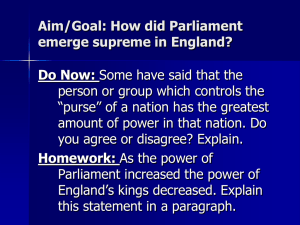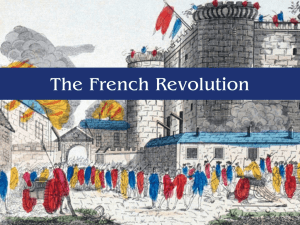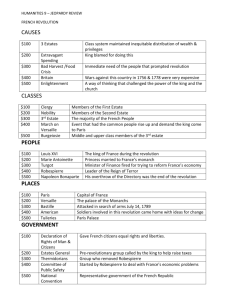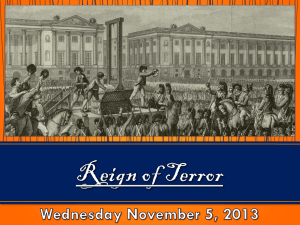Comparison of the English Revolution and French Revolution
advertisement
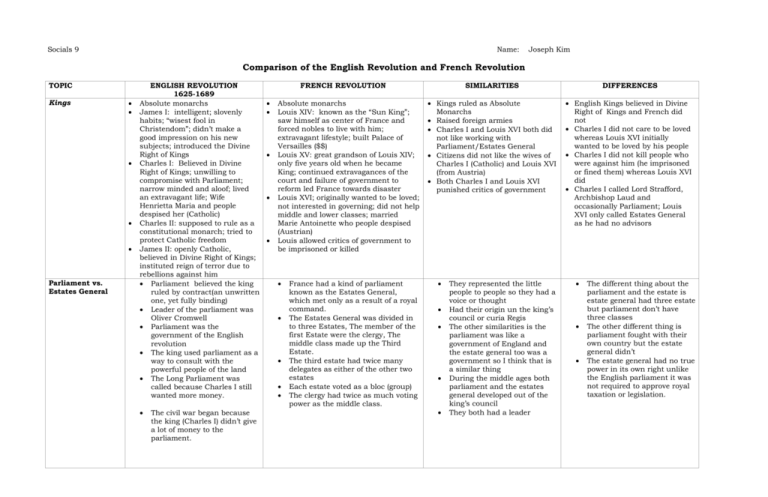
Socials 9 Name: Joseph Kim Comparison of the English Revolution and French Revolution TOPIC Kings Parliament vs. Estates General ENGLISH REVOLUTION 1625-1689 Absolute monarchs James I: intelligent; slovenly habits; “wisest fool in Christendom”; didn’t make a good impression on his new subjects; introduced the Divine Right of Kings Charles I: Believed in Divine Right of Kings; unwilling to compromise with Parliament; narrow minded and aloof; lived an extravagant life; Wife Henrietta Maria and people despised her (Catholic) Charles II: supposed to rule as a constitutional monarch; tried to protect Catholic freedom James II: openly Catholic, believed in Divine Right of Kings; instituted reign of terror due to rebellions against him Parliament believed the king ruled by contract(an unwritten one, yet fully binding) Leader of the parliament was Oliver Cromwell Parliament was the government of the English revolution The king used parliament as a way to consult with the powerful people of the land The Long Parliament was called because Charles I still wanted more money. The civil war began because the king (Charles I) didn’t give a lot of money to the parliament. FRENCH REVOLUTION Absolute monarchs Louis XIV: known as the “Sun King”; saw himself as center of France and forced nobles to live with him; extravagant lifestyle; built Palace of Versailles ($$) Louis XV: great grandson of Louis XIV; only five years old when he became King; continued extravagances of the court and failure of government to reform led France towards disaster Louis XVI; originally wanted to be loved; not interested in governing; did not help middle and lower classes; married Marie Antoinette who people despised (Austrian) Louis allowed critics of government to be imprisoned or killed France had a kind of parliament known as the Estates General, which met only as a result of a royal command. The Estates General was divided in to three Estates, The member of the first Estate were the clergy, The middle class made up the Third Estate. The third estate had twice many delegates as either of the other two estates Each estate voted as a bloc (group) The clergy had twice as much voting power as the middle class. SIMILARITIES DIFFERENCES Kings ruled as Absolute Monarchs Raised foreign armies Charles I and Louis XVI both did not like working with Parliament/Estates General Citizens did not like the wives of Charles I (Catholic) and Louis XVI (from Austria) Both Charles I and Louis XVI punished critics of government English Kings believed in Divine Right of Kings and French did not Charles I did not care to be loved whereas Louis XVI initially wanted to be loved by his people Charles I did not kill people who were against him (he imprisoned or fined them) whereas Louis XVI did Charles I called Lord Strafford, Archbishop Laud and occasionally Parliament; Louis XVI only called Estates General as he had no advisors They represented the little people to people so they had a voice or thought Had their origin un the king’s council or curia Regis The other similarities is the parliament was like a government of England and the estate general too was a government so I think that is a similar thing During the middle ages both parliament and the estates general developed out of the king’s council They both had a leader The different thing about the parliament and the estate is estate general had three estate but parliament don’t have three classes The other different thing is parliament fought with their own country but the estate general didn’t The estate general had no true power in its own right unlike the English parliament it was not required to approve royal taxation or legislation. TOPIC Revolutionary leaders ENGLISH REVOLUTION 1625-1689 In the civil war an army led by Oliver Cromwell a leader in parliament and a puritan was victorious The parliament under the direction of Cromwell tried the king and treason Oliver Cromwell led parliament to a victory against royalist at Marston Moore and Naseby Soon after senior army officers named Oliver Cromwell the lord protector or military dictator FRENCH REVOLUTION Significance in history Charles needed money to support the people(but he didn’t have much because he used it to himself) so he called the parliament but he count agree and hen he raised money illegally and people got angry so it stated like this I think the significance in history of the English revolution, its was not that violent as like the French revolution because in French the king got a lot of people executed un like the English revolution Oliver Cromwell was a huge impact on the English revolution because when he got his new model army to the Naseby and got a victorious against the king and the supporters, so that was a huge hit SIMILARITIES Maximilien was an official during the French revolution and one of the principal architects of the reign of terror The third estate was represented by Maximillien de Robespierre Robespierre was dedicated to the defense of the rights of the poor During the tennis court oath the Robespierre, Mirabeau and Sieyes decided to write France a constitution Maximilien was an official during the French revolution and one of the principal architects of the reign of terror Robespierre came to dominate the committee of public safety the principal organ of the revolutionary government during the reign of terror but in 1794 he was overthrown and guillotined The primary significance of the French Revolution was that it removed power from a small group of elite rulers and established a democratic leadership representing the French citizenry The French Revolution erupted in 1789 in response to attempts to raise taxes on citizens to cover debts incurred by the government. France had invested heavily in the American Revolution, and King Louis XVI greatly mismanaged the country's finances. As a result, France was on the brink of bankruptcy and desperate for ways to raise revenue the Third Estate was denied the right to vote on proposals. However, this group represented nearly 98 percent of France's population. The representatives held a meeting on a nearby tennis court and made the Tennis Court Oath, in which they denounced the current governmental system. This led to revolts and outright civil war DIFFERENCES Both leaders were enthusiastic about using mass murder and ethnic cleansing to get what they wanted Robespierre got king louis XVI put on trial, and he executed many people like the Girondins. Oliver Cromwell got Charles II executed he also executed some of the Charles II supporters in parliament Robespierre was guillotined, Oliver Cromwell ended up making the system of government more like monarchy like Robespierre both the English Civil War and the French Revolution sought to curb the power of the King, the French Revolution was much more radical than the English Civil War both challenged the power of the ruling classes and the established clergy. they both executed the ruling monarchs both ended feudalism Robespierre gained power through the people electing him to the position of committee leader of public safety but Oliver Cromwell used the new model army and the puritans in parliament to help him to be the lords protector Cromwell started to become tyrannical he started making laws however Robespierre with his power he executed over 30 000 people who were either thought to be traitors English had a lord proctor unlike the French revolution The French had 3 classes of estate but the parliament don’t The voting: in France the women can’t vote only the men could but in English anyone can vote TOPIC Causes of Revolution Glorious Revolution vs. Directory ENGLISH REVOLUTION 1625-1689 The English Civil War has many causes but the personality of Charles I must be counted as one of the major reasons. The new taxes led to violent quarrels with Parliament, which had long claimed the right to control taxation, and was not going to allow taxes to be increased unless it was given full control over the machinery of State. Religion was a major cause of the English Civil War. It was part of a Europe wide conflict between Roman Catholicism and Protestantism The death of Charles II in 1685 created a problem for parliament His successor James II was openly catholic William's successful invasion of England with a Dutch fleet and army led to his ascending of the English throne as William III of England jointly with his wife Mary II of England, in conjunction with the documentation of the Bill of Rights For the first time the monarch was chosen by parliament not hereditary right, the divine right was dead Mary and William agreed to the terms of a new bill of rights FRENCH REVOLUTION SIMILARITIES International: struggle for hegemony and Empire outstrips the fiscal resources of the state Political conflict between the Monarchy and the nobility over the reform of the tax system led to paralysis and bankrupt Social antagonisms between two rising groups the aristocracy and the bourgeoisie The financial strain of servicing old debt and the excesses of the current royal court caused dissatisfaction with the monarchy, contributed to national unrest, and culminated in the French Revolution The rule of Robespierre was replaced with the directory Which was controlled by the middle class The new government gave most of the power to people of property which signaled a return to special privileges for people with money Only this group could vote and elect members to government DIFFERENCES One similarity of both revolutions was the causes financial problems Another one is Both King Charles I and Louis XVI were experiencing debt because of financial problems left behind from previous monarchs The tax system was similar to English and French revolution The English Civil war is arguably a lot more complicated. It wasn't just over the executive power of the king but also the future of the English and Scottish churches. The French Revolution on the other hand was an anti-religious movement The similarities between the glorious revolution vs. the directory is they were both laws like the bill of rights and directory the glorious started when the death of Charles II and the directory started when Robespierre was guillotined so it is the rule of Robespierre. They are both rights The different things about the directory and the glorious revolution is when parliament invited William of orange to become queen and king of England But in directory there was nothing like that in the directory it just says about that the middle class controlled the directory The two countries had their rights but I think the country that benefited the most is the French Revolution because for the feudalism was big in the French revolution. Feudalism was a good thing for the king but it’s bad for the third estate the workers, that who use feudalism in order to live or survive. The declaration of the right of man and citizen legalized any belief in any religion that made man equal before the law that created freedom for the French people. They had a new paper currency the Franc. The idea of liberty equality and fraternity effect to gain peoples benefits. There were many people killed and the poor and landless could not vote or get a land. French revolution was better benefit because even the king was dead in the English revolution there was still war happening in English so many or a lot of people were dead so there are no benefit for the low class to pay the feudal due. The main thing about the English revolution was the way between fights and wars with parliament and the king so they didn’t get a lot of benefits. So this is why I think the French revolution got more benefits than the English revolution.



